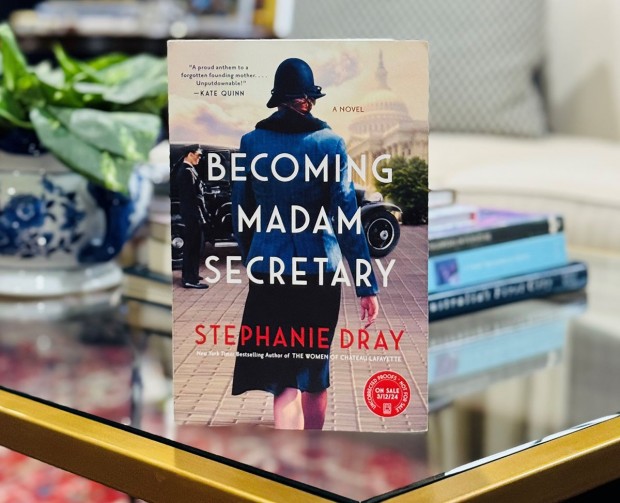Women’s History Month Picks

March is Women’s History Month in the United States, and the month is devoted to celebrating and recognizing the plethora of contributions that women have made to our world. This week I selected books about women who left their mark in important ways.
I am amazed and thrilled to see that more and more stories about courageous and pioneering women are making their way out into the world so that their stories will not be forgotten or so that more will be known about them. I hope you enjoy these four books about women who deserve to be remembered and recognized during Women’s History Month:
Becoming Madam Secretary by Stephanie Dray – Stephanie Dray brings to life Frances Perkins, the first woman to serve as a U.S. cabinet member. Appointed by Franklin Delano Roosevelt as Secretary of Labor, she is the mother of Social Security and helped create and launch FDR’s New Deal. Becoming Madam Secretary is an enthralling story about a woman who would not be cowed by the men around her and who paved the way for future women to serve in high-powered government positions. I loved learning so much about her and her role as Secretary of Labor, her professional relationship with FDR, and the time period following the Depression. Dray includes an Author’s Note detailing what small things changed for narrative flow purposes. I highly recommend this one.
The Personal Librarian by Marie Benedict and Victoria Christopher Murray – Belle de Costa Greene worked as J.P. Morgan’s personal librarian and curator of his private library housed in a townhouse off of East 36th Street before the collection became the Morgan Library and Museum. While she became an influential individual in the art world and one of the country’s most prominent librarians, she hid a devastating secret – she was a Black woman “passing” as a white woman and moreover was the daughter of the first Black graduate of Harvard. The Personal Librarian chronicles Belle’s life and legacy and what it was like to be torn between success and the desire to be herself. Benedict and Murray effectively evoke Belle’s constant struggle to straddle the two worlds she was caught between and the downhill trajectory of race relations during her life that further complicated her choices. All sorts of fascinating book-related information is woven seamlessly into the story including details related to rare books, manuscripts, and incunabula (books printed before 1501) including the Gutenberg bibles, the first books printed in English and who printed them, and so much more. I loved this book so much and know it will be in my top ten for the year.
The Queen of Sugar Hill by ReShonda Tate – The Queen of Sugar Hill opens with the night Hattie McDaniel becomes the first Black woman to win an Academy Award for her role as Mammy in Gone with the Wind and follows her life until her death from cancer at age 52. While Hattie believed that winning this historical Oscar would change her career for the better, both the role and the award created more problems for her instead. Many Blacks despised her for her depiction of a subservient Black slave to the point that the NAACP waged a full-blown war against Hattie and other actors they felt portrayed Blacks negatively, and whites disliked her for being too Black. In the midst of the attacks on her, Hattie continued to fight for more roles for Black actors while also tackling housing discrimination and navigating numerous fraught romantic relationships. Tate brings Hattie McDaniel to life in a sympathetic but honest manner that had me rooting for her even when I didn’t agree with her decisions. This is such a fascinating time period in Hollywood, and I headed down numerous rabbit holes researching the people and events contained in the book. Historical fiction fans will love this one.
A Right Worthy Woman by Ruth P. Watson - In this compelling historical fiction title, Watson spotlights trailblazer Maggie Lena Walker, a Richmond woman who created the first Black run bank in the United States and pioneered Black responses to the early Jim Crow era policies that were adopted in the later Civil Right Movement. As a teenager, Walker was brilliant, outspoken, and aware of the economic discrepancy between her Jackson Ward neighbors and her laundress-mother's wealthy white clients so she decided to make it her life’s work to help her community bridge that gap. She launched a newspaper, bank and department store in her neighborhood as well as organizing boycotts and helping Black neighbors and friends exert their economic power; she was an incredibly forward thinking woman whose story should be known more widely. Readers will enjoy learning more about this influential woman who left an indelible mark on history.
For more book recommendations and bookish thoughts, see Cindy’s monthly Buzz Reads column, her Thoughts from a Page Podcast or follow @ThoughtsFromaPage on Instagram. Find upcoming Conversations from a Page events here.
Want more buzz like this? Sign up for our Morning Buzz emails.
To leave a comment, please log in or create an account with The Buzz Magazines, Disqus, Facebook, or Twitter. Or you may post as a guest.



